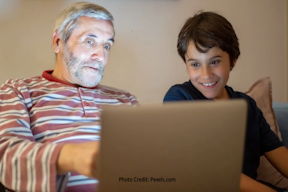Guest Post by Teresa Greenhill: Sept 26, 2024
Anybody that uses a cell phone, a computer or tablet connects to the internet. It’s a fact of life and we can’t avoid using the internet. But, along with the convenience comes a whole bunch of people who are trying to take our information. This post, from Teresa Greenhill at mentalhealthforseniors.com, provides some useful information about staying safe while using the internet.
Online Safety Tips For Adults and Kids

The internet has made life easier for people of all ages, kids and adults alike. Parents can book family vacations easily online, for example, while kids can use internet resources for homework help.
From banking to socializing to gaming, the internet has changed our lives. While it’s convenient, internet use also puts people at risk of becoming victims of cybercrime. You don’t want people to access personal files or accounts, like banking or email. Unfortunately, such threats are increasing, and cybercrime is estimated to cost the world $20 trillion annually by 2026. Here are six tips for online safety.
Make sure your home WiFi network is secure.
Your home network allows your whole family to get online easily. Unfortunately, clever hackers can infiltrate home WiFi systems and gain access to mobile devices, computers, and even smart devices like your Alexa, ring cam, baby monitor, and more. Even with your network and device precautions, you still want to take extra steps to secure your online accounts.
Use strong passwords for all your accounts and devices
Change the default name and password. Limit access to your network. Don’t give the password to just anybody.From financial portals to email accounts, there are many things you log into every day that require a password.
Everyone should follow password best practices. Cybernews recommends using passwords that are at least 12 characters long, include upper- and lower-case letters, and have numbers and special symbols and change your passwords frequently.
Add a verification layer
Two step verification can send a one time pin number as a text or email and create an additional security layer for your online accounts. If you really want to be secure use a wet signature appliocation.
Using a wet signature can enhance your online security by providing an additional layer of authentication, making it harder for unauthorized individuals to forge your approval. It acts as a tangible verification step, guaranteeing only you can authorize critical documents and transactions. Requiring a wet signature offers peace of mind by combining traditional security practices with modern digital workflows.
Get a VPN for computers and smart phones
A virtual private network, VPN, can add another layer of protection and help keep your family safe from online threats. Basically, a VPN creates a secure connection between the device it’s installed on and a VPN server, which conceals the device’s location and activity. This makes it harder for cyber criminals to infiltrate the device. Opt for a reputable paid VPN that covers multiple in-home devices.
Screen suspicious calls and texts.
Reverse phone lookup enables you to screen calls and texts, ensuring you don’t respond to fraudulent or spam numbers that could lead to financial loss or personal information breaches. It allows you to find information regarding specific area codes, helping you identify unknown callers. This tool can also help you report harassing or threatening calls, contributing to a safer online and offline environment. You enhance your security and peace of mind by using reverse phone lookup.
Beware of common online scams targeting kids and adults.
Online scammers know their audience and will carefully target different age groups. It’s essential to understand what kinds of threats you may face. Kids are more likely to be targets of video-related scams. For instance, they may be asked to enter personal information to gain access to a free video. Kids may also be tempted to enter private forums or chat rooms where predators may lurk.
Reap the mental and emotional rewards.
Protecting yourself online isn’t just about safeguarding personal information—it also significantly boosts mental and emotional well-being. When you take proactive steps to secure your digital life, you reduce the risk of cyber threats that can lead to stress, anxiety, and sleepless nights. Knowing your data is safe brings a sense of control and peace of mind, allowing you to relax and focus on other aspects of life. This peace of mind often translates into better sleep, less worry, and a more balanced emotional state, ultimately enhancing your overall quality of life.
The Internet offers many benefits, but it’s also home to threats. Parents should educate kids about malware, viruses, and other risks while encouraging best practices like creating strong passwords. Use the above guide to get started, and keep finding ways to protect yourself and your family online.
If you enjoyed this article, you can find lots more helpful information from the folks at mentalhealthforseniors.com
